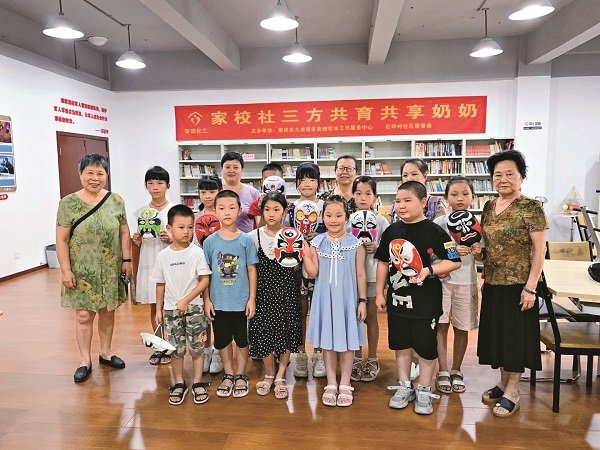'Shared Grannies' Help More People Enjoy Love, Company
 |
| "Shared grannies" help to take care of children before their parents leave work. |
In a modern society, the public can share many things, such as bicycles, cars and portable power banks. That is commonly referred to as a "sharing economy." If "shared grannies" sounds new, that is because it is a new concept in Chinese society.
A team of elderly women — who serve as "shared grannies," who help working parents pick up their children from school, help children with their homework, and accompany children to various entertainment activities — in Southwest China's Chongqing recently received considerable praise online.
The team, in Shipingcun Community, in Chongqing's Jiulongpo District, has nine women in their 60s or 70s. Most of the women live alone. They volunteer to look after more than 20 students from Yangshilu Primary School.
The community, with 6,500 households, has more than 20,000 residents, of whom more than 5,000 are aged 60 or older.
As children generally finish their school day before their parents finish their work day, most working parents are unable to retrieve their children from school, and many of those parents do not have relatives or friends on whom they can rely to pick up their children. As such, they are in desperate need of a temporary guardian.
On the other hand, many elderly residents are not ready to settle into retired life, and they are eager to continue contributing to their community. One grandmother, for example, used to tell community workers her hobbies were reading and writing, and, if necessary, she could teach calligraphy to children.
Under such circumstances, Shipingcun Community Neighborhood Committee and Chongqing Amber Social Work Service Center, a public-service organization established in the district, launched the "shared grannies" program in April.
Deng Lihong, 66, volunteered to be a "shared granny" after she saw the recruitment advertisement. "Although we are old, we should still do something good for our country. Children are the future of our country. I am happy to participate in the program. I feel young and pleasant with the children, and my retired life is meaningful," she says.
Cui Jingqin, a self- employed laborer, has relied on the "shared grannies" since the program began. "The atmosphere here is good. My son has made progress this semester, especially in math," she says. Another parent, surnamed Chen, adds, "We are very confident about letting the 'shared grannies' take care of our children after school."
Peng Mei, secretary of the Party committee of Shipingcun Community, says there are plans to improve the program. "The program is part of the school-family-community partnership in educating children. In addition to 'shared grannies,' we also recruit college students to serve as volunteers. We will buy more books and organize more activities for children in the community activity room.
"The 'shared grannies' are dedicated, and they enjoy their time with the children. The interactions between the families in need and 'shared grannies' are mutually beneficial. The sense of fulfillment and happiness means a lot to the grannies," Peng says.
Photo Supplied by the Interviewee
(Women of China English Monthly October 2021 issue)
Please understand that womenofchina.cn,a non-profit, information-communication website, cannot reach every writer before using articles and images. For copyright issues, please contact us by emailing: website@womenofchina.cn. The articles published and opinions expressed on this website represent the opinions of writers and are not necessarily shared by womenofchina.cn.






.jpg)

 WeChat
WeChat Weibo
Weibo 京公网安备 11010102004314号
京公网安备 11010102004314号